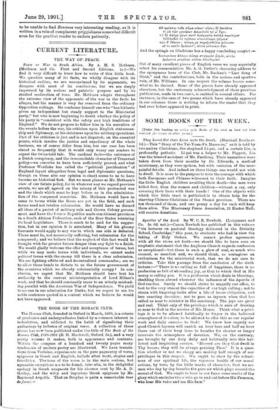CURRENT LITERATURE.
THE WAY OF. PEACE.
Peace or War in South Africa. By A. M. S. Methuen. (Methuen and Co. First and Second Editions. le.)—We
find it very difficult to know how to write of this little book.
We question many of its facts, we wholly disagree with its historical outline, we are unconvinced by its arguments, we disagree with most of its conclusions, but we are deeply impressed by its serious and patriotic purpose and by its studied moderation of tone. Mr. Methuen adopts throughout the extreme view of the opponents of the war in the facts he alleges, but his manner is very far removed from the ordinary Opposition railings. He confesses himself one who "has hitherto given an independent but steady support to the Ministerial party," but who is now beginning to doubt whether the policy of
his party is "consistent with the safety and high traditions of England." We do not propose to follow him in his narrative of the events before the war, his criticism upon English statesman- ship and diplomacy, or his strictures upon the military operations. Part of -his criticism is just and is not disputed; on the essential points, which involve the justice and expediency of the whole
business, we of course differ from him, but our case has been stated so frequently that it would only weary our readers to repeat the twice-told tale. The cardinal facts—the existence of a Dutch conspiracy, and the irreconcilable character of Transvaal policy—we conceive to have been sufficiently proved, and what Professor Westlake has called the "political justification" of England (apart altogether from legal and diplomatic questions, though on these also our opinion is clear) seems to us to have become an historical fact. But we must glance at Mr. Methuen's view of our future policy, for in whatever way we regard previous events, we are all agreed on the misery of this protracted war and the ideals which must be kept before us in the administra- tion of the conquered countries. Mr. Methuen would have us come to terms while the Boers are yet in the field, and such terms need not involve submission. He would have us discard
all ideas of a pei iod of military rule and Crown Colony govern- ment, and have the former Republics made constituent provinces
in a South African Federation, each of the Boer States retaining its local Legislature. There is much to be said for the sugges- tion, but in our opinion it is antedated. Many of his gloomy forecasts would apply to any war in which one side is defeated.
There must be, not necessarily suffering, but submission for the conquered ; and we believe that the neglect of this fact would be fraught with far greater future danger than any fight to a finish.
We would gladly welcome the offer and acceptance of terms, but while we may make terms with individuals, we cannot make political terms with the enemy till there is a clear submission. We are fighting sclitte:ed and decentralised commandos ; are we to allow these bands to dictate to us the future government of the countries which we already substantially occupy ? In con- clusion, we regret that Mr. Methuen should have lent his authoiity to the current misinterpretation of Lord Miler's work, and that he should constantly recur to an utterly mislead-
ing parallel with the American War of Independence. We yield to no one in our admiration for Burke, but we regret to see his noble sentences quoted in a context which we believe he would not have approved.




















































 Previous page
Previous page